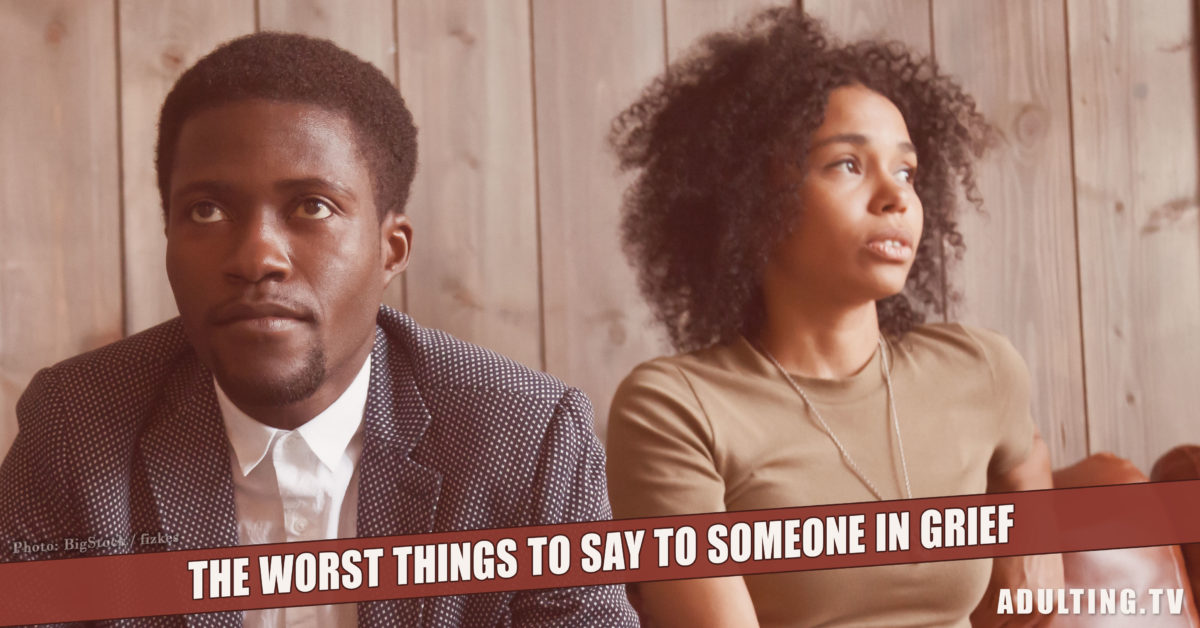I’ve dealt with my share of grief in the last year, both personally and through my friends and family. In that time, I’ve learned that saying the right thing to a grieving person can be a tricky prospect – both through hearing some eye-rolling phrases from other people and doing the same thing myself.
It might seem overly complicated to toe the line between caring and callous, but it’s worth it to try. People in grief are sensitive, and they need the people around them to respect that fragile state. Saying the wrong thing can easily send a grieving friend into a spiral of negativity, while the right thing can help carry them through the day.
Here are some of the worst – and best – things to say to someone in grief.
The worst things to say.
The Same Thing Happened to Me Once…
When someone is in the middle of a crisis, the last thing they want to hear is your story about the time you were in exactly the same situation. It shifts the dialogue from their troubles to yours and implies that the situation will work out fine just like it did for you.
Doing this minimizes the other person’s struggle. Even if you’re just trying really hard to relate, it usually comes off as attention-seeking behavior. No matter how similar your situation is, hearing about it probably won’t make the other person feel better.
People in misery don’t want to feel like their problems don’t matter. They need to feel heard and acknowledged, even if they’re going through a relatively common situation. They probably know they aren’t the first person to struggle in this way – they just don’t need to be reminded of it.
It Could Always Be Worse
Do you remember being a kid, complaining about something inane and stupid and having your parents remind you about the starving kids in Africa? It didn’t make you feel better as a five-year-old forced to eat Brussel sprouts, and it won’t make you feel better now.
Misery is not mutually exclusive. Just because there are people living without running water doesn’t mean the death of your pet is any less sad. Telling someone that there’s something worse out there is akin to saying, “Your problems aren’t big enough and you don’t deserve to feel bad.”
Of course, things could always be worse, but knowing that doesn’t really help.
I Couldn’t Handle This
After my friend Melissa’s boyfriend died, people kept telling her the same thing: “I don’t know how you’re dealing with it. I wouldn’t be able to.”
She wasn’t sure how to respond. Were they trying to compliment her composure or remind her of the gravity of her situation?
As with many of these situations, the intention was probably innocent but misguided. People dealing with tragedy aren’t heroes or saints – they’re just getting by one day at a time because they have no other choice. Empty flattery isn’t going to make them feel better.
Aren’t You Over It Yet?
Everyone has their own way of grieving and how they do so is not up for debate. Getting over a death or bad health diagnosis like getting over a breakup. Everyone does it in their own time.
Never suggest that someone might be mourning too long. It’s an entirely unique process that has no set timeline. A widower isn’t obligated to get over his wife in six months or a year or even six years.
On the other hand, don’t tell someone that they’re getting over a spouse or partner too quickly.
God Has a Plan
This is a common phrase you’ll hear when tragedy strikes, especially if you live in the Midwest or the Bible Belt. I’m not a religious person so I really don’t care when someone says they’ll pray for me, but I really hate hearing “God has a plan.” I don’t believe that God plans for bad things to happen or that my pain is meant to teach me some kind of lesson.
Even if the person you’re speaking to is religious, it’s probably still best to avoid telling them God has a reason for their pain and suffering. Even the most devout Christian might recoil at hearing about God’s plan for their sister to die in her 30s.
If you’re talking to someone suffering a loss, don’t tell them, “They’re in a better place.” It doesn’t make anyone happy to imagine their loved one in heaven, and considering that about 25% of Americans are atheist, it’s probably best to leave God out of the equation entirely.
How Did it Happen?
When bad things happen, nosy people want to know all the details. They don’t care if it’s hurtful or inappropriate to repeat the story. They just want to satisfy their inner gossip and get the scoop.
If someone wants to tell you how their husband died in a car crash because they weren’t wearing a seatbelt, it’s their prerogative. But don’t ask them the details of the crash – and especially don’t insinuate with your question that it’s their fault they died.
Let Me Know What I Can Do
This phrase, while full of good intentions, is mostly meaningless. Sure, we’d all like to think that if our friend needed something, they’d tell us exactly what they want. But it doesn’t work like that.
It’s awkward to ask for help, and most people don’t want to feel like a burden. When my friend Jess had oral surgery a few years ago, I offered to bring her some homemade soup so she would have something to eat while recovering.
She gladly accepted my offer and it felt good bringing her something useful. If I had told her, “Let me know if you need something,” it’s unlikely that she would have said, “Can you make me chicken noodle soup tomorrow and bring it by my house?”
Have a specific idea in mind. If there’s nothing physical you can do, text or call to check in. You can even drop by if you think that would go over well. Initiating contact reminds them that they’re not alone, and offering a specific favor will seem more genuine. Come over and take the dogs for a long walk, cook a big batch of chili or do their laundry. These small actions will say more than an hour-long conversation.
Don’t do anything you’re not comfortable with. If you’re going to institute a regular favor, like mowing the lawn every couple weeks, don’t slack off. Give as much as you can and only what you’re comfortable with.
Saying Nothing at All
When something bad happens to you, it can make the people in your life feel uncomfortable. They don’t know what to say or how to say it. Instead of saying the wrong thing, sometimes they’ll say nothing at all.
That hurts more. By refusing not to acknowledge what you’re going through, it’s like they’re saying, “Your pain is too much for me to bear, so I’m going to pretend everything’s fine, even if that hurts you.”
If you’re the type who gets uncomfortable during sad or awkward situations, you should still make an effort to reach out, even if it’s just to say, “I’m thinking about you.”
Staying away from that person will only make them feel forgotten, lonely and isolated during a time when they should feel surrounded by love. My friend Melissa said when people stopped reaching out, it felt like they were telling her, “I got over what happened and it’s time you did too.”
The best things to say.
Obviously, there are some things it’s better not to say to someone grieving, but that doesn’t mean you should avoid trying to help. There are a few phrases that can help to lighten their mood and bring some modicum of comfort.
It’s OK to not feel OK.
People going through hard times are often told to keep their chin up or look on the bright side. They’re reminded to count their blessings and be grateful for what they have.
It makes sense to tell others to be optimistic, to not lose hope or fall into despair – but telling someone to be positive is a toxic attitude. People can’t help feeling crappy during a crappy time, and telling them to be the opposite feels fake and forced.
Sometimes, a person in grief has no choice but to feel shitty. No matter how uncomfortable or sad it might make other people, it’s ok to feel pain. By letting someone feel their feelings, it helps them deal with the problem instead of avoiding it.
How are you doing today?
The general question of “How are you” can seem too overwhelming to answer when you’re going through a rough patch. Asking a parent who just lost their child how they’re doing can seem like a dumb question. How do you think they’re doing? They’re devastated, they’re in mourning, and they’ll never feel normal again. Do you really want to hear how they are?
Instead, ask them how they’re doing today. It’s easier for them to answer and you’re more likely to get a genuine response. When you’re grieving or dealing with a health scare, each day is different. Some days will be especially hard, while others will be almost close to normal.
Wow, that really sucks
Nobody wants their pain diminished, no matter how trivial it might seem. If a friend of yours loses her pet rat and you think rats are a dumb pet, the only thing you should say in that scenario is, “Wow, that really sucks.”
Acknowledging their pain actually makes them feel better. It’s you telling them, “I see what you’re going through and I’m accepting that it’s real.” Avoiding the topic or trying to mitigate it makes them feel like they’re crazy for being upset.
Just thinking about you
It’s easy to forget about your friend’s horrible news after weeks have gone by. Unfortunately, that’s probably when they need to hear from you most. People move on quickly. Flowers die, cards go in the trash and casseroles are devoured.
It’s during those times that a person starts feeling like they need to get over it since most of their family and friends have. Don’t be that person. Check in with your friend weeks and months after the incident with a simple text, “Just thinking about you. I’m free to talk if you want.”
Nobody wants to feel forgotten, and the reminder that someone is still thinking about you can bring a sense of relief.
I Don’t Know What to Say
Sometimes, there are no words – yet everyone feels the need to be Oprah and say something inspirational. During those moments, it’s better to be humble. Saying, “I don’t know what to say,” is better than pretending to have all the right answers. It’s honest and shows humility.
Use these moments to listen and be there for your friend. I’ve often found that they’re not looking to hear the perfect thing from me – they just want to talk and share their feelings without judgment.
What to do when you say the wrong thing.
It’s happened to all of us. You’ll be talking to your friend who’s just lost her parent or partner and you inadvertently put your foot in your mouth. As soon as the words come out, you realize what you’ve done and that it’s too late.
When you mess up, it’s tempting to retreat into your cocoon and pretend it never happened.
But that’s not what you should do. As soon as you realize your goof, call or text the person and apologize for what you said. Tell them you love them and don’t want to cause them more pain and suffering. More often than not, they’ll understand what you meant and forgive your slip-up.
Yes, it’s going to be awkward if you apologize, but it’ll strengthen your relationship in the end. You won’t be the first person to say something stupid, but you might be the first who says they’re sorry.
Do you have any tips on how to help a grieving person? Let us know in the adultingHALP Facebook community.






